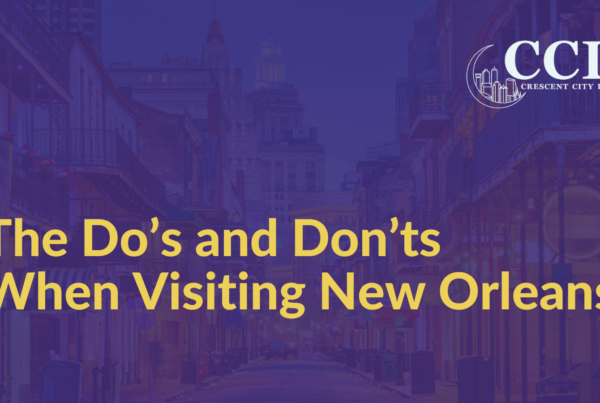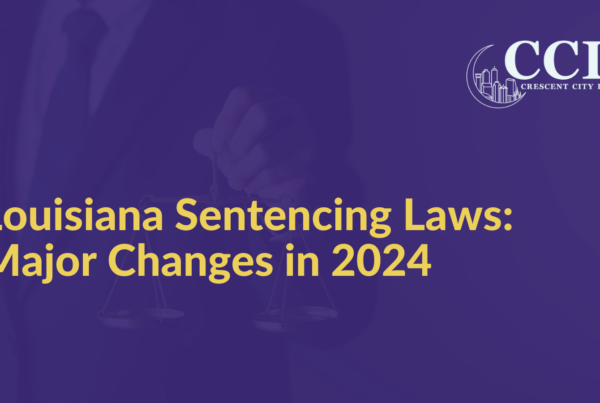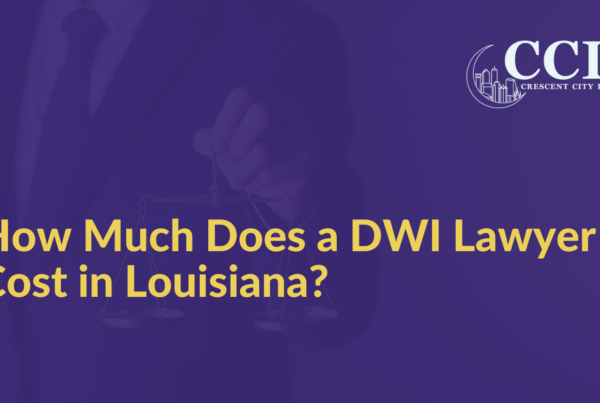New Orleans and Southern Louisiana are known to permit open containers in public, allow bars to stay open 24 hours a day, and even have drive-thru daiquiri shops. Unfortunately, these may be a cause of increased incidents of drinking and driving, which lead to a number of negative consequences from auto accidents, DWI charges, and injuries or deaths. As a New Orleans attorney, do not drink and drive is the best advice I can offer. Unfortunately, not everyone adheres to my advice and people do drive after they have had more alcohol or drugs than they should because they believe they are not impaired. Many of those who drive after one too many are caught by local law enforcement.
What is the Difference Between a DUI & DWI?
Essentially the only difference between Driving Under the Influence (DUI) and a Driving While Intoxicated (DWI) is the way it is phrased. In Louisiana it is generally referred to as a DWI and means: the illegal driving of an automobile, truck, aircraft, boat or vessel while impaired by alcohol and/or drugs. If you are pulled over in New Orleans for suspicion of a DWI and charged by law enforcement for a DWI they will call it “Operating a vehicle while intoxicated.”
What is the Legal Drinking Level for Driving in Louisiana?
- When you drink alcohol, your body records a blood alcohol concentration (BAC) that determines how much alcohol is in your body’s system based on the weight per unit of volume. Sounds confusing, right? Well, the simple way to put it is:
- How much did you drink?
- How fast?
- How much do you weigh?
These are approximate blood alcohol charts for men and women that you can follow. In Louisiana, if you are under the age of 21, you are considered above the legal limit while driving if your BAC is .02 or higher. If you are 21 or older, then you will be charged with a DWI if your BAC is .08 or higher. How do you determine what your level is? If you are an adult of 21 years or old, and your BAC is under .08, then you can still be charged with a DWI if the police believe you have mixed your alcohol with other drugs or medications, or the officer believes that you are impaired as a result of your alcohol consumption. In other words, even if you blow below a .08, you can be arrested and convicted for DWI in Louisiana.
Implied Consent Law: What Will Happen if I Am Pulled Over for Drinking and Driving
When you’re pulling over as a suspected drunk-driver, the police will be conducting an investigation against you. As such, everything you say or do can, and will, be used against you as evidence. Remember: You always have the right to refuse to do or say anything which may incriminate you. One of the most important pieces of information to know before you get behind the wheel of a car in New Orleans, in Louisiana, or really anywhere in the United States, is that if you are a licensed person operating a vehicle, you are automatically consenting to an approved chemical test, whether it is blood, breath or urine, in order to show law enforcement to obtain evidence of your intoxication. It is called the “implied consent law.” Pursuant to La.R.S. 32:661:
- Any person, regardless of age, who operates a motor vehicle upon the public highways of this state shall be deemed to have given consent, subject to the provisions of R.S. 32:662, to a chemical test or tests of his blood, breath, urine, or other bodily substance for the purpose of determining the alcoholic content of his blood, and the presence of any abused substance or controlled dangerous substance as set forth in R.S. 40:964 in his blood if arrested for any offense arising out of acts alleged to have been committed while the person was driving or in actual physical control of a motor vehicle while believed to be under the influence of alcoholic beverages or any abused substance or controlled dangerous substance as set forth in R.S. 40:964.
- The test or tests shall be administered at the direction of a law enforcement officer having reasonable grounds to believe the person, regardless of age, to have been driving or in actual physical control of a motor vehicle upon the public highways of this state while under the influence of either alcoholic beverages or any abused substance or controlled dangerous substance as set forth in R.S. 40:964. The law enforcement agency by which such officer is employed shall designate in writing and under what conditions which of the aforesaid tests shall be administered.
If you consent to blowing for a breathalyzer test in Louisiana, and your BAC is below .08, there is a chance that your license will not be suspended. It is possible that if you blow under a .08, you will be released from police custody, however release is not guaranteed. If you consent to blowing into the breathalyzer test in Louisiana and your BAC .08 or higher, then your license will be suspended for 90 days and you will be arrested for DWI. If you do not consent to blowing for a breathalyzer, then your license will be suspended for 365 days and you will be arrested for DWI. In addition to the breathalyzer test, the officer will ask you for your driver’s license, insurance, and registration, just like any other traffic stop. It is important to have these documents ready and current. The police will also ask whether you’ve had anything to drink recently. My best advice is to answer to the questions of the law enforcement, but remember your rights: You always have the right to refuse to answer questions which might incriminate you. Do not get out of the car unless you are asked to by the officer. In the event a field sobriety test is conducted, REMEMBER YOUR RIGHTS! The ‘science’ behind field sobriety tests is not perfect. These tests are subjective ways for the officer to compare your drunken activity to a sober person. However, since the test is subjective both for you and the officer, there is no sure way to beat these tests. Personally, I would not recommend submitting to field sobriety tests, but I am confident that if you refuse to do them, you will spend the night in jail.
Who Should I Contact if I am Pulled Over for a Suspected DWI in New Orleans?
If you are pulled over by law enforcement for a suspected DWI in New Orleans, you will be brought into custody at the local parish prison or jail. There will be many thoughts going through your mind at this time. The most important concern will be when and how you will get out of jail? If you’re one of the lucky few, then you’ll be able to post a cash bond on your own. If not, then you’ll be calling family and friends to post bail. You may also want to call a Confident New Orleans DWI Lawyer, like myself. As a New Orleans traffic attorney, I am here to help you in a time of need and I may be able to secure your release from jail without having to put up a bond or bail. Feel free to contact me via e-mail or telephone at (504) 264-9492 or (866) 459-4478 for a free consultation to discuss your DWI arrest in Louisiana. Now that you’re out of jail, we can talk about Part II of a DWI next week.






